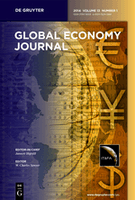
Global Economy Journal
Scope & Guideline
Navigating the complexities of the global economic landscape.
Introduction
Aims and Scopes
- Global Economic Dynamics:
The journal explores how global economic trends, including globalization and technological advancements, influence national and regional economies, particularly in developing and emerging markets. - Financial Development and Stability:
Research on the interplay between financial development, stability, and economic growth is a core focus, examining how financial systems can support human development and mitigate risks. - Public Policy and Economic Governance:
The journal emphasizes the role of public policy in shaping economic outcomes, analyzing the equity-efficiency trade-off, fiscal policies, and the impact of governance on economic performance. - Impact of Globalization:
It investigates the effects of globalization, including international trade, capital flows, and sanctions, on various economies, with particular attention to their socio-economic consequences. - Sustainability and Green Finance:
There is a growing emphasis on sustainable economic practices, including the adoption of green financing strategies and the role of renewable resources in achieving economic growth.
Trending and Emerging
- Technological Impact on Economies:
Recent studies focus on how technological advancements affect economic structures, particularly in developing regions, highlighting the importance of technology in driving economic growth and transformation. - Economic Sanctions and Corruption:
There is an emerging interest in the relationship between economic sanctions and corruption, exploring how sanctions impact governance and economic outcomes globally. - Green Finance and Renewable Resources:
The transition towards sustainability is increasingly reflected in publications that discuss green financing strategies and their role in fostering economic growth while addressing climate change. - Financial Inclusion and Development:
A notable trend is the focus on financial inclusion, examining its effects on economic stability and competitiveness, particularly in less developed regions. - COVID-19's Economic Impact:
Research on the economic implications of the COVID-19 pandemic remains significant, exploring its effects on global supply chains, financial markets, and policy responses.
Declining or Waning
- Historical Economic Theories:
Themes related to classical economic theories, such as mercantilism, appear less frequently in recent publications, indicating a shift towards contemporary issues and empirical analysis. - Traditional Trade Models:
Research focusing on traditional trade models and their applications seems to be declining, possibly due to the emergence of new models that better capture the complexities of current global trade dynamics. - Static Economic Analysis:
There is a noticeable decrease in studies employing static analyses of economic conditions, as the journal increasingly favors dynamic models that account for changes over time and the influence of external shocks.
Similar Journals
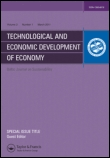
Technological and Economic Development of Economy
Exploring the Synergy Between Technology and Economic Growth.Technological and Economic Development of Economy, published by VILNIUS GEDIMINAS TECH UNIV, is a leading journal dedicated to advancing the fields of economics and finance. With an ISSN of 2029-4913 and an E-ISSN of 2029-4921, this open access journal has been providing a platform for innovative research since 2005 and has been fully open access since 2018, promoting the free exchange of knowledge. The journal's impressive ranking in the 2023 Scopus Ranks, where it holds the 23rd position out of 317 in the finance category, demonstrates its significance in the academic community, achieving a remarkable 92nd percentile. Located in Lithuania at SAULETEKIO AL 11, VILNIUS LT-10223, it aims to encourage interdisciplinary dialogue on technological advancements and their economic implications, making it an essential resource for researchers, professionals, and students who seek to explore the intersections of these vital fields. With a converged publication timeline extending through 2024, the journal is well-positioned to influence future economic policies and technological innovations.
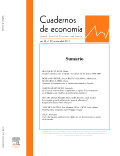
Cuadernos de Economia-Spain
Navigating the landscape of econometrics and finance.Cuadernos de Economia-Spain, a prestigious journal published by the ASOC CUADERNOS ECONOMIA, DEPT ECONOMIC ANALYSIS, has established itself as a valuable resource in the field of economics, econometrics, and finance since its inception in 1978. With a strong focus on disseminating innovative research and analysis, this journal boasts an impressive Scopus rank of #58 out of 288 in its category, placing it within the 80th percentile of its field. The journal, located in Madrid, Spain, serves as a vital platform for scholars and practitioners to explore contemporary and emerging economic issues, contributing significantly to the academic discourse. Operating under a Q2 quartile classification for 2023, Cuadernos de Economia is particularly well-regarded for its rigorous peer-review process and commitment to high academic standards. Although it adheres to a traditional subscription model, the journal's influence continues to extend across various research communities, making it an essential reference point for those seeking to delve into the complexities of economic analysis and policy.
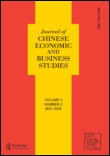
Journal of Chinese Economic and Business Studies
Bridging Academia and Industry in Chinese Business StudiesJournal of Chinese Economic and Business Studies, published by Routledge Journals, Taylor & Francis Ltd, serves as a vital platform for the exploration and dissemination of research focused on the dynamic landscape of China’s economy and business practices. With a keen emphasis on innovative economic theories and empirical studies, this journal aims to bridge gaps between academia and industry by publishing high-quality articles that address contemporary issues and trends affecting China's economic environment. The journal holds a commendable Q2 ranking in the field of Economics, Econometrics, and Finance as of 2023, and it ranks 45th out of 288 journals in the general category, placing it in the 84th percentile, a testament to its rigorous academic standards and impact within the field. Although it does not offer open access, the journal is dedicated to contributing significantly to scholarly discourse, making it an essential resource for researchers, professionals, and students aiming to deepen their understanding of the complexities of Chinese economic and business dynamics, particularly from 2010 to 2024.

African Review of Economics and Finance-AREF
Navigating Economic Challenges with Scholarly PrecisionAfrican Review of Economics and Finance (AREF) is a distinguished academic journal dedicated to advancing knowledge in the fields of economics and finance within the African context. Published by PORTHOLOGOS PRESS, the journal aims to provide a platform for research that addresses critical economic and financial issues that affect Africa, promoting innovative solutions and fostering discussion among scholars and practitioners. With its ISSN 2042-1478 and E-ISSN 2410-4906, AREF has established itself as a vital resource for researchers, professionals, and students seeking to deepen their understanding of African economies. The journal’s commitment to open access ensures that its valuable research findings are readily available to a global audience, thereby enhancing visibility and engagement. Through rigorous peer-review processes and thoughtful editorial leadership, AREF contributes significantly to the discourse on economic development, policy analysis, and financial practices in the region.
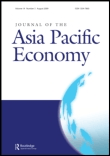
Journal of the Asia Pacific Economy
Fostering Insights into Asia Pacific Economic DevelopmentsThe Journal of the Asia Pacific Economy is a leading academic journal dedicated to exploring economic, political, and social developments across the Asia Pacific region. Published by Routledge Journals, Taylor & Francis Ltd, this journal has been a pivotal platform for scholarly communication since its inception in 1996, contributing to a deeper understanding of regional dynamics through a rigorous peer-review process. With an impressive positioning in the Q2 category across multiple disciplines, including Development, Geography, Planning and Development, and Political Science and International Relations, the journal excels in disseminating high-quality research that influences policy and academic discourse. Researchers and professionals alike benefit from its accessibility and scholarly relevance, drawing from diverse methodologies and theoretical frameworks to address pressing issues of the Asia Pacific economy. As it continues to publish until 2024, the journal remains dedicated to advancing knowledge and fostering collaboration within the academic community.

Financial and Credit Activity-Problems of Theory and Practice
Unveiling Insights into Accounting and Economic PracticesFinancial and Credit Activity-Problems of Theory and Practice is an esteemed academic journal published by FINTECHALIANCE, specializing in the multifaceted realms of accounting, business, economics, and finance. Since its inception in 2017, this Open Access journal has committed to disseminating vital research that addresses both theoretical frameworks and practical issues within these fields, making it an invaluable resource for researchers, professionals, and students alike. With its ISSN 2306-4994 and E-ISSN 2310-8770, the journal aims to foster a robust dialogue among stakeholders, contributing to the advancement of knowledge and innovative practices in financial and credit activities. Notably positioned in the Q4 Quartile across several categories, including Accounting and Finance, the journal continues to strive for improvement, fostering future growth within the academic community. Situated in Kyiv, Ukraine, this journal stands as a beacon for advancing scholarly discourse and enhancing practical understanding in its targeted fields.
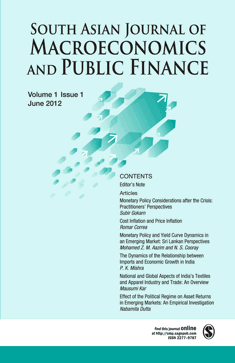
South Asian Journal of Macroeconomics and Public Finance
Connecting Theory and Practice in Public FinanceSouth Asian Journal of Macroeconomics and Public Finance (ISSN: 2277-9787, E-ISSN: 2321-0273) is a distinguished academic journal published by SAGE Publications India Pvt Ltd. Operating from the United Kingdom, this journal serves as a vital platform for researchers and professionals in the fields of macroeconomics and public finance, with a commitment to advancing the understanding of these disciplines across South Asia and beyond. With a Q3 ranking in both Economics and Econometrics and Finance as of 2023, it positions itself as a relevant contributor to ongoing discussions and developments, offering insights supported by its Scopus rankings, where it is placed in the 44th and 41st percentiles in Finance and Economics respectively. The journal spans converged years from 2012 to 2024, fostering a collaborative space for cutting-edge research and rigorous analysis. This journal is essential for scholars seeking to engage with contemporary economic challenges and policy implications, paving the way for innovative solutions and informed decision-making.
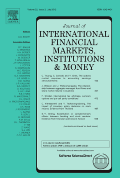
Journal of International Financial Markets Institutions & Money
Innovating Research in International FinanceThe Journal of International Financial Markets, Institutions & Money, published by Elsevier, serves as a leading platform for the dissemination of high-quality research in the fields of finance, economics, and econometrics. With an impressive impact factor reflected in its status as a Q1 journal in both categories for 2023, it ranks among the top journals, positioned at #47 out of 317 in Finance and #111 out of 716 in Economics. This journal offers a unique focus on the interplay between financial markets and institutions on a global scale, making it an essential resource for scholars, practitioners, and students alike. The journal welcomes innovative theoretical, empirical, and applied research, contributing to an exciting dialogue that shapes the future of international finance. For researchers looking to publish their findings, this journal is committed to rigorously engaging with contemporary financial phenomena, positioning itself as a vital cornerstone of academic and professional discourse.
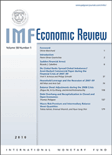
IMF Economic Review
Pioneering Research that Challenges Conventional Economic ParadigmsIMF Economic Review, published by Palgrave Macmillan Ltd, stands as a preeminent journal in the fields of Economics and Business Management, holding a prestigious Q1 ranking in both categories as of 2023. With an ISSN of 2041-4161 and an E-ISSN of 2041-417X, this journal not only showcases high-quality, peer-reviewed research but also embraces the principles of Open Access, promoting wide dissemination of its findings to researchers, professionals, and students alike. Spanning significant years from 2010 to 2024, the IMF Economic Review features innovative analyses and insights that challenge conventional economic paradigms and foster deeper understanding of global economic dynamics. Its impressive Scopus ranking places it in the top 10% of economics journals globally, affirming its vital role in advancing academic discourse and practical application in economics and finance. For those dedicated to exploring the intricacies of economic theory and practice, the IMF Economic Review is an invaluable resource that not only informs but also inspires.
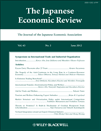
JAPANESE ECONOMIC REVIEW
Decoding economic complexities in Japan and beyond.Japanese Economic Review, published by Springer Heidelberg, is a renowned academic journal that aims to advance the understanding of economic processes within the context of Japan and the Asia-Pacific region. With an ISSN of 1352-4739 and E-ISSN of 1468-5876, this journal features high-quality research articles that span a broad range of topics in economics and econometrics. Ranked in the Q2 category for Economics and Econometrics as of 2023, it holds a Scopus rank of #332 out of 716, placing it in the 53rd percentile among its peers. Although not Open Access, the journal invites contributions that provide insights and empirical analyses beneficial to both academics and practitioners. Emphasizing a deep understanding of economic dynamics, the Japanese Economic Review is essential reading for anyone interested in the implications of economic policies and trends, making it a significant platform for scholarly dialogue and research dissemination.